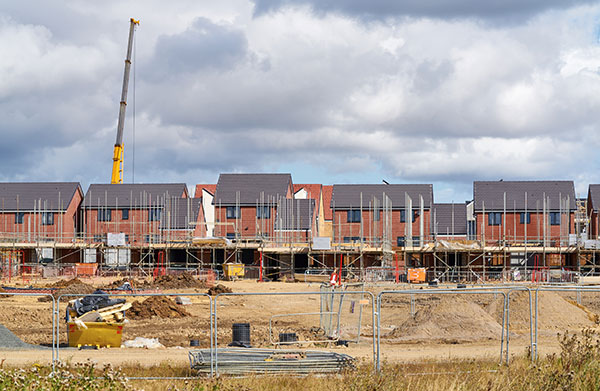The UK’s commitment to achieving net zero by 2050 is more than a climate target—it is a societal imperative. It intersects with the housing crisis and energy poverty, but recent assessments indicate that we are behind schedule. Meeting the sixth carbon budget and achieving an 81% emissions reduction by 2035, as recommended by the Climate Change Committee (CCC), will require bold action and financial innovation. Crucially, this includes transforming how we heat homes, as heating accounts for a third of emissions. The financial tipping point—when renewable heating solutions like heat pumps become not just environmentally preferable but economically accessible—is central to progress. Housing Association Magazine’s Joe Bradbury discusses:
The sixth carbon budget outlines legally binding limits on greenhouse gas emissions between 2033 and 2037. However, recent reports suggest the UK is unlikely to meet these targets without significant policy shifts. Heating plays a significant role, with millions of homes reliant on fossil fuel systems such as gas boilers.
Encouraging the transition to renewable technologies like air-source and ground-source heat pumps is critical. These technologies remain underutilised due to high upfront costs, lack of awareness, and limited government support. Housing associations, tasked with providing affordable, energy-efficient homes, are on the frontline of this issue.

Image © iStock
The cost of inaction
Failure to address heating emissions has severe consequences. Rising global temperatures, extreme weather events, and escalating energy bills will disproportionately affect vulnerable groups. The housing sector must mitigate these risks, but it cannot act alone. Without government incentives, housing associations may struggle to retrofit existing stock and adopt renewable technologies. Furthermore, inaction risks worsening the housing crisis itself, as higher energy costs and inefficient homes push more households into fuel poverty.
Delays also increase costs. Retrofitting homes today is cheaper than addressing the issue years later when stricter regulations, higher material costs, and inflation exacerbate the challenge. Proactively addressing these barriers now will prevent further financial strain down the line.
Heat pumps: barriers and opportunities
Heat pumps offer a low-carbon solution for residential heating. They extract heat from the air or ground, producing fewer emissions than gas boilers. Despite their advantages, uptake remains low. High installation costs, ranging from £7,000 to £15,000 per unit, are a significant barrier for both homeowners and housing associations. These costs are especially burdensome for social housing providers, whose budgets are already stretched thin.
While the UK’s Boiler Upgrade Scheme provides grants of up to £5,000, this often falls short of what’s needed to make heat pumps viable for widespread adoption. The lack of skilled installers further complicates deployment at scale. Addressing these challenges is essential to making renewable heating solutions viable and scalable.
Crossing the financial tipping point
Reaching the financial tipping point for renewable heating requires a multi-faceted approach:
Enhanced Government Support: Expanding subsidies, grants, and tax incentives will make renewable heating solutions more accessible. Policies must drive widespread adoption, not just incremental change. Additional funding and a simplified grant application process can empower housing associations to invest confidently.
Scaling up production: As demand increases, the cost of heat pumps will decrease. Government and private-sector investment in manufacturing can accelerate this trend. Investing in domestic production facilities will not only lower costs but also create jobs in the green economy.
Energy efficiency first: Heat pumps work best in well-insulated homes. Housing associations should prioritise retrofitting properties with insulation, draught-proofing, and double glazing to complement renewable systems. This approach maximises the benefits of heat pumps while reducing energy consumption overall.
Green finance models: Innovative financial solutions, like green bonds or low-interest loans, can help housing associations invest in renewable systems without compromising affordability. Partnerships with financial institutions can unlock new funding streams to support decarbonisation efforts.
Training and workforce development: Building a skilled workforce is essential for heat pump deployment. Apprenticeships and certification programmes will help fill the skills gap, ensuring that installations are carried out efficiently and to a high standard.
A collaborative effort
The financial tipping point is part of a broader transition to a low-carbon, equitable housing future. Collaboration between housing associations, government, and the private sector is essential. This includes piloting innovative solutions, sharing best practices, and lobbying for ambitious climate policies. By working together, stakeholders can overcome the financial and logistical barriers that currently hinder progress.
Housing associations have shown leadership in adopting sustainable practices. With support, they can drive the renewable heating revolution. Demonstrating successful implementation at scale can serve as a blueprint for other sectors to follow.
In summary
Achieving net zero isn’t just about legal targets; it’s about creating affordable, comfortable, and sustainable homes. It’s about reducing tenants’ energy bills and protecting communities from climate change impacts. And it’s about showing that the UK’s housing sector can solve one of the greatest challenges of our time.
The financial tipping point is within reach, but action is needed now. With decisive steps, the UK can chart a course to net zero that benefits both people and the planet.
This article and other blog’s by Joe Bradbury appear regularly on Mitsubishi Electric’s The Hub, visit les.mitsubishielectric.co.uk/the-hub
- Log in to post comments














